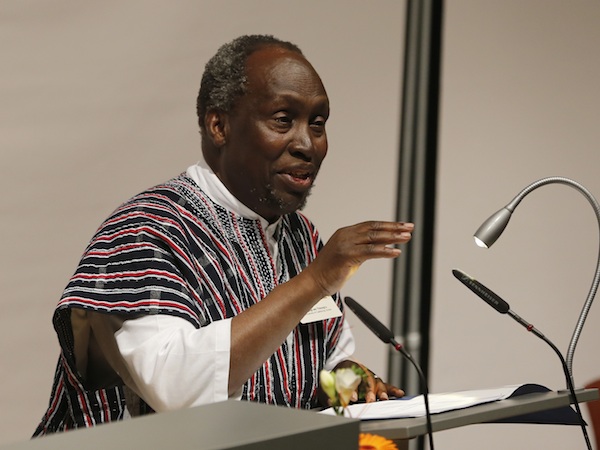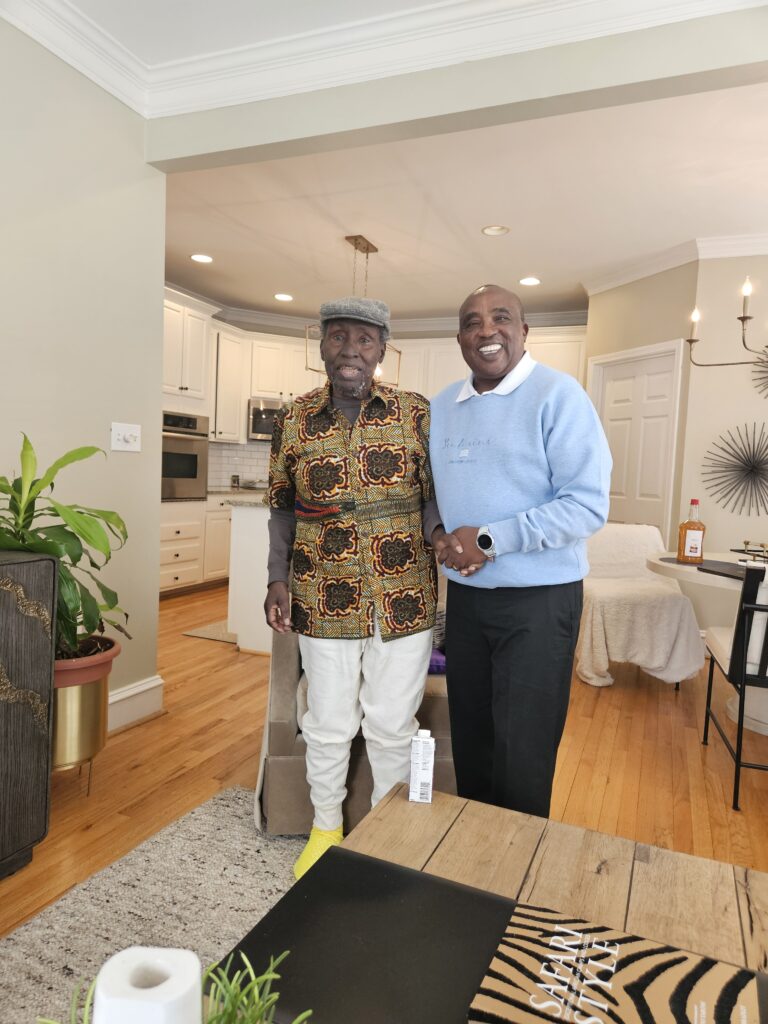Ngũgĩ Wa Thiong’o Does Not Need Your Crocodile Tears
He often said, “Our lives must be a constant struggle against systems that dehumanize and erase us.”

He often said, “Our lives must be a constant struggle against systems that dehumanize and erase us.”

By Professor Peter Ndiang’ui, Fort Myers, Florida, USA
For the past year, Ngũgĩ wa Thiong’o and I spoke nearly every single day — sometimes as many as three to five times in a single day. On May 18th, just ten days before his passing, we spoke five times. These conversations moved seamlessly from the light-hearted to the profound — his love for mukimo, his amusement over the Kikuyu poem he had helped me craft for my wife Muthoni (whom he fondly insisted on calling Nyarari), and his weighty reflections on the enduring betrayal of Kenya’s working poor. More than anything, Ngũgĩ remained preoccupied — consumed, really — with one unflinching vision: justice for the oppressed, dignity for the worker, and sovereignty for the African mind.

He often said, “Our lives must be a constant struggle against systems that dehumanize and erase us.” His own life bore witness to that struggle — from prison cells to exile, from censored books to cultural exile. And yet, until his final breath, Ngũgĩ remained unsilenced.
One of our final discussions revisited an article I had written the year before, urging the Kenyan government to formally honor him. He asked if there had been any progress. I told him that Tetu MP Geoffrey Wandeto had delivered it to the Clerk of the National Assembly, but it remained ignored. He chuckled with that disarming clarity that had become his signature. “It’s not about being honored,” he said, “It’s about who does the honoring.”
Let this be understood without ambiguity: Ngũgĩ wa Thiong’o rejected the idea of accolades handed down by regimes that have crushed the very ideals he stood for. When I asked whether he would accept any recognition from President William Ruto — whom we referred to in private as Mwaura Andu (“he who strips people of their goods”) — he was unequivocal.
“The only medal I would accept,” he told me, “is one given by the workers and the farmers — those who have borne the burden of this country while others prospered from their sweat.”
This was not grandstanding. It was moral resolve. Ngũgĩ’s life was not shaped by a hunger for applause but by a deep, abiding sense of responsibility to the people whose stories he carried in his novels, plays, and essays.
He asked me to deliver a message to Martha Karua, who had visited him a few weeks earlier: that she must never abandon her mission to fight for the disenfranchised across Eastern Africa. That was his charge to her — and to all of us.
Last Saturday, we arranged a meeting with professors from the Literature Department of University of Nairobi. We had very good conversation and planned how Ngugi would address the students later in the year. After the meeting, he called me again. He thanked me for putting it together. He let me know that besides Kamirithu and his place of place of birth, the Literature Department was his other favorite place because he helped in its re-birth to become an authentic African department.
And then, later that same day, he called me once more, his voice firmer, more pointed.
“Niwaigua Nding’uri?” he asked, invoking his affectionate nickname for me.
“When I die, do not let them cry crocodile tears. They detained me. They exiled me. They tried to silence me.
And when I am gone, they will cry the loudest. Don’t let them.” Let them know that I do not need anybody’s tears. I need people to celebrate my life.
This was not bitterness. It was instruction. It was prophecy. And it is now my responsibility to fulfill it with this message.
Ngũgĩ wa Thiong’o does not need the orchestrated mourning of those who once threw him into the dungeons of Kamiti Maximum Security Prison.
He does not need the faux reverence of those who exiled him from the land whose soil he adored and whose language he restored to the center of cultural dignity.
He does not need hashtags, soundbites, or the empty rhetoric of political opportunists whose legacies are littered with betrayal and subjugation.
He needed then, and still needs a Kenya that values intellectuals not as threats to be neutralized but as custodians of national consciousness.
He needed a state that honors its writers, thinkers, and teachers while they are alive — not a system that feigns grief once it has buried them.
He needed, as he once wrote, “a decolonized mind capable of imagining a liberated future.” That future, to him, began with the farmer in Kirinyaga and the student in Kisumu, not with the elite in Nairobi boardrooms.
That future has not yet arrived. But Ngũgĩ never stopped believing in its arrival. His belief was not naïve; it was defiant. “Hope,” he told me once, “is not a feeling. It is a decision. And I have chosen it every day.”
And so, let me be absolutely clear:
Do not allow the very system that shackled him to now sanitize his memory.
Do not let Ruto — whom Ngũgĩ once described, without euphemism, in The Dictator’s Last Laugh as “the consummate chameleon” — wrap himself in Ngũgĩ’s legacy while trampling on the very people Ngũgĩ died defending.
Do not permit power to manufacture tears it never earned.
Ngũgĩ’s life was not a performance. And his death must not be turned into political theater.
If you must mourn him, do it through action. Organize. Speak truth. Resist injustice. Decolonize your mind. And above all — uplift the aruti a wira na arimi anyinyi — the workers and farmers whose toil builds this nation from the ground up.
Goodbye, Mwalimu.
You were not only our teacher. You were our conscience — Africa’s mirror and prophet. I will miss our daily conversations. But I will not miss your voice, because it still speaks — in my mind, in your books, in every child who dares to write in their mother tongue. This, right here, is my final promise to you.
No crocodile tears.
Only truth.
Only fire.
Only forward.
Your words will never die.
And neither will the struggle you lived for.
